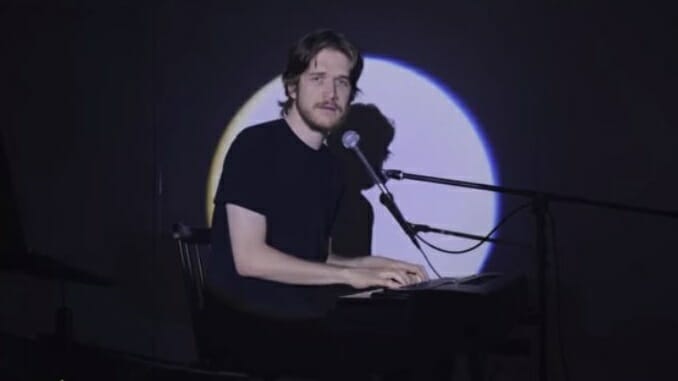Bo Burnham’s Inside Answers Millennial Expectations

In Make Happy, Bo Burnham’s comedy special from 2016, the YouTuber-turned-comedian-turned-director shifts focus with about 15 minutes left in the show. Burnham was 25 at the time, 10 years into his career and in a relationship with director Lorene Scafaria, a partner 12 years his senior. Burnham kneels to the audience and gives a speech about the poisonous, prison-like nature of social media and our constant performance for one another, a disparate segment from a joke 45 minutes prior about being called a “faggot” by an offstage presence, crossing and uncrossing the lines of homophobia and intolerance. He talks and subsequently sings about his need for the audience, his fascination with performance, and his own self-hatred, culminating in a song asking “Are you happy?” over and over again as he sits in a room alone with his keyboard. Candid moments in a sea of overwrought comedy: the simplification of the Bo Burnham brand.
Those last 15 minutes are expanded in Burnham’s Inside, the first special in five years by the now-30-year-old, shot, edited, written, and directed by him during the pandemic. Those stretches of perceived vulnerability, whether genuine or not, fill Inside, making up the skeleton for an artistic portrait of a depressed, ultra-talented comedian that lives to perform, despite the panic attacks it might cause him. Once again, he’s in the same small room, messier now, with both Burnham and this space weathered by the events of the past year. But like his previous three specials, he begins with lightness, in beard length and lyrical choice, singing about Facetiming with his mom, a white woman’s Instagram, sexting, and his role as a white, straight male in saving the world, even if that world, in his own words, is run by genocide, oppression, and other white males.
A millennial who became famous through the technological advancements he despises, Burnham’s agitation increases throughout the special, forced back inside to balance his thoughts and attempt to be funny for an empty room. The silly little jokes told by this lanky white guy with declining mental health, a paraphrased line from the end of Make Happy, still end up as a reflection of his own (contrived) insecurity, crucifying himself upon a cross made of sunlight, begging for accountability and attempting to imagine his life without a constant audience.
Burnham’s comedy has always been targeted towards white males, though, specifically woke-ish white male millennials, those that grew up understanding their elevated place in society yet imprinted a sense of untrue difficulty into their status. It’s a fair criticism levied against Burnham, that his winking at the camera becomes tired, and mocking one’s whiteness doesn’t alter the attached privilege. It’s tied to the fact that he claims to be one of the good ones, further exemplified in his off-type casting in Promising Young Woman as the trustworthy white man who’s actually just a part of the problem.
For some millennials, he has the ability to be a marker for growth, as we have watched him mature over the last 15 years. We see physical changes (like a beard), of course, and comedic and melodic improvements to his musical arrangements shine bright during Inside. That growth feels measurable. His unbroken aura of loneliness, his unstable connection and fascination with the internet, and his inability to go five minutes without self-inflicted insults ring true for a subset of a generation, a group of 25-35 year-olds that do, in fact, feel overwhelmed and overdue. We’ve been performing for each other for years, and most of us will never have the impact we perceive to have, still achieving societal and personal worth far above our lowered, likes-driven expectations. Those thoughts are magnified during Inside, as Burnham’s mental state looks to be stretched wafer-thin, pulled by expected happiness without the desired result.
-

-

-

-

-

-

-

-

-

-

-

-

-

-

-

-

-

-

-

-

-

-

-

-

-

-

-

-

-

-

-

-

-

-

-

-

-

-

-

-








































